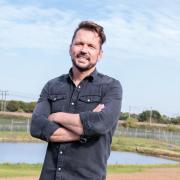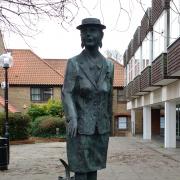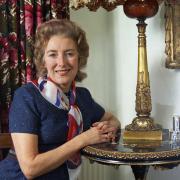As the slightly eccentric deputy head of a Harlow comprehensive in Educating Essex, Stephen Drew became something of a celebrity. He has now set himself the aim of transforming Brentwood County High, where he is now head, into an ‘Outstanding’ school. Pat Parker asked him how he plans to do it
STEPHEN Drew, now head of Brentwood County High School, is probably the best-known teacher in the country. He first came to prominence three years ago as the patient, stern, but slightly oddball deputy head of Passmores School (now Academy) in Harlow, in the C4 series, Educating Essex. And this year, in C4’s Mr Drew’s School For Boys, he took on the challenge of helping 11 of the country’s most unruly boys and their frazzled parents.
He is currently engaged on his biggest challenge yet: to turn around Brentwood County High — judged as ‘Satisfactory’ by Ofsted on three successive inspections. He has been there two years, and it is now rated ‘Good’. But that is not good enough for Mr Drew — as he is universally known. His aim is for it to be ‘Outstanding’ within three to five years.
His determined commitment is already producing results. ‘Our GCSE results last year were the best ever,’ he tells me, as we sit in his office. ‘They went up from 58% A* to C in English and Maths to 66%. We’re looking at going over 70% this year, which would be a really big psychological milestone for the school.’
The award-winning Educating Essex gave a candid picture of everyday life at Passmores — judged ‘outstanding’ by Ofsted in 2008 — including bullying, a teenage pregnancy and Mr Drew being falsely accused of assault after asking a girl to remove a hoodie (CCTV pictures proved his innocence).
Did he think it was a fair representation of the Harlow comprehensive? ‘I always say yes, because I think it was a realistic, warts-and-all representation,’ he replies.
‘The production company were looking for a school which was very open, very honest, would argue with them when necessary, and which was prepared to trust people,’ he says. ‘But I think they also decided we were suitably bonkers.’
The stocky Mr Drew and the six-foot tall Mr Goddard made an entertaining double act. But why had they decided to risk letting in the cameras?
Partly, it was because they were proud of their school. ‘We had moved it from being on the verge of special measures in 2001 to being outstanding in 2008,’ he explains. ‘We are a very, very popular school, and we had a lot of confidence in what we did. Plus, we’d always said to the children, “Take opportunities. Take risks” and we thought it wasn’t really fair to say that and then not live by it.’
Prior to filming, 65 fixed cameras and numerous microphones were installed during the October half-term.
‘On their first day back, we had a few kids jumping up and tapping cameras or whatever, but after that day they just got on with it. When kids are misbehaving, they don’t have the energy to think about the cameras. They just get on with it.’
The resulting series showed Passmores in a positive light, not least for the fair-minded, caring way in which Messrs Goddard and Drew dealt with some of their more troubled and troublesome teenagers.
Does he feel it was ethical for the children to have their personal problems exposed on national television? ‘I think it’s important to understand that teenagers today live their lives in an incredibly social way on social media,’ he replies. ‘They have different perceptions of these matters to us. They trusted us as a school to look after them and were confident enough to share their stories.’
The Year 11 students featured were able to see the footage before it was broadcast, and received home visits and counselling. None chose to opt out of filming.
Mr Drew, 41, grew up and still lives in Cambridgeshire. He studied History and Politics at Middlesex University, only deciding in his final year that he might like to teach. He tried his hand at a variety of jobs beforehand, from working in a flooring factory in Haverhill to being a sales rep for Coca Cola. He combined his PGCE studies with working as a deputy manager of a pub at nights and weekends. From the moment he started his PGCE course, he knew he had made the right career choice.
‘I just thought, “This is right, this is what I want to do”. I had a natural affinity with young people and a strong desire to make their lives better and educate them. Teaching is a vocation — a passion. It’s a privilege to do and it has always been, and will always be, that for me.’
He did his teacher training in a tough East End boys’ school and then taught history at Stowupland High in Suffolk before becoming head of history at Passmores in 2002. ‘I found myself a school which looked like a challenge. I wanted to make a difference.’
He set himself the goal of becoming a head teacher by the time he was 40 — an ambition he achieved shortly after Educating Essex was broadcast, when he was offered his position at Brentwood County High. It was the first headship he applied for.
C4 soon offered him a starring role in another series, Mr Drew’s School for Boys. Mr Drew was given the daunting challenge of trying to turn around the lives of 11 of the most badly-behaved boys in the country. The boys and their parents spent a month residing at a college in mid-Essex, where they underwent an intensive programme aimed at helping them change the often destructive patterns of behaviour they had fallen into.
‘I wasn’t desperate to do anything else on TV — I wasn’t seeking it,’ he says. ‘But I wanted to do something about families, which showed how difficult parenting is and how parents end up in situations over which they have no control.’
The series was as much about helping mums and dads improve their parenting skills as trying to improve the behaviour of their disruptive children. Several of the parents had chaotic lifestyles, regularly swore in front of their children (who then swore habitually themselves), allowed them to go to bed after midnight, play adult video games and drink endless caffeinated fizzy drinks. Mr Drew urged them to take control, impose rules and order, set a good example and not pass on their own negative attitudes to schooling to their children. He feels the programme did yield positive results. ‘They’re all doing better. But better is a very open word. They are able to function better. A couple are now in support units, but the difference is that that’s been done without their parents blaming everyone else and in a much more positive, supportive way. The parents are much calmer; they accept their children need that help.’
Mr Drew believes passionately that no child should be written off, whatever his or her background. ‘If children fail, it’s because adults have failed them — their parents, society — all of us.’
It is this positive commitment to allowing every child to achieve that he has brought to Brentwood County High. He saw his initial task as raising morale and aspiration among staff and students. ‘I started by saying very clearly to staff that there is absolutely no reason why this could not be an outstanding school and that the vast majority of the people who will help achieve that are already here.’
On training days, he wears a T-shirt with a motto which neatly sums up his educational philosophy: ‘Failure is not an option’.
Students were left in no doubt that expectations of them were high. ‘We set very clear standards on uniform, behaviour, on the way they speak, on litter — on things that are very basic and simple. But you fight those battles, and then you have fewer bigger battles to fight.’
Mr Drew spends part of every day picking up litter and expects students to do likewise. He’s installed more bins, outside benches, has had overgrown areas cleared and the school completely repainted inside. ‘When I first came here, the school looked very tired and unloved. I believe that if students feel you are doing your best for them, they will want to do their best.’
He has set up an extensive rewards system of certificates, and letters and texts to parents. He does not believe in exclusions — misbehaving students are sent to a reintegration centre within the school grounds. He has also gone out of his way to make himself accessible. Parents can phone him outside school hours, if necessary, or attend his regular surgeries.
There may, he says, be more television work in the future, but it’s not his priority. Transforming Brentwood County High comes first. He relishes the challenge of improving the school, and loves being its head. ‘I’ve got people all across the school who are doing amazing things. As head, all I’m doing is enabling people to be the best they can be.’ ?



























